Posted on 12/28/2025 14:00 PM (CNA Daily News - Vatican)
 Pope Leo XIV addresses pilgrims gathered in St. Peter’s Square at the Vatican for recitation of the Angelus on Dec. 28, 2025. | Credit: Vatican Media
Pope Leo XIV addresses pilgrims gathered in St. Peter’s Square at the Vatican for recitation of the Angelus on Dec. 28, 2025. | Credit: Vatican Media
Vatican City, Dec 28, 2025 / 09:00 am (CNA).
Pope Leo XIV has sent three trucks carrying humanitarian aid to parts of Ukraine hit hardest by bombardments, where residents are facing severe shortages of electricity, water, and heat.
Cardinal Konrad Krajewski, the pope’s almoner, disclosed the delivery to Vatican media on Dec. 27, saying the convoy carried special food that can be dissolved in a small amount of water to produce energy-rich soups with chicken and vegetables.
Krajewski described the shipment as a small gesture of closeness from the pope to Ukrainian families on the feast of the Holy Family, celebrated Dec. 28.
The trucks, he said, arrived in the Vatican shortly before Christmas loaded with supplies donated by South Korean food company Samyang Foods. As had happened on previous occasions, including during the pontificate of Pope Francis, the aid was then redirected to war zones most severely affected by strikes, where basic utilities are often unavailable.
Krajewski said the delivery underscores that the pope not only prays for peace but also wants to be concretely present with families who are suffering.
This story was first published by ACI Prensa, CNA’s Spanish-language news partner. It has been translated and adapted by CNA.
Posted on 12/28/2025 13:30 PM (CNA Daily News - Vatican)
 Pope Leo XIV greets pilgrims gathered in St. Peter’s Square at the Vatican for the recitation of the Angelus on Dec. 28, 2025. | Credit: Vatican Media
Pope Leo XIV greets pilgrims gathered in St. Peter’s Square at the Vatican for the recitation of the Angelus on Dec. 28, 2025. | Credit: Vatican Media
Vatican City, Dec 28, 2025 / 08:30 am (CNA).
Pope Leo XIV on Sunday urged Christian families to “cherish the values of the Gospel” and protect the “flame of love” in their homes against modern myths of success, power, and comfort that he said often leave people isolated and divided.
Speaking to pilgrims in St. Peter’s Square before the Angelus on Dec. 28, the feast of the Holy Family of Nazareth, the pope reflected on the Gospel account of the family’s flight into Egypt and contrasted the trust of Jesus, Mary, and Joseph with what he called the fear-driven cruelty of King Herod.
“It is a moment of trial for Jesus, Mary, and Joseph,” Leo said, adding that “the bright image of Christmas is suddenly almost eclipsed by the disturbing shadow of a deadly threat.”
The pope described Herod as “a cruel and bloodthirsty man” who is “deeply lonely and gripped with the fear of being deposed.” After hearing from the Magi that the “king of the Jews” had been born, Herod “decrees that all children of the same age as Jesus should be killed,” the pope said.
“In Bethlehem there is light and joy,” Leo noted, recalling the shepherds who “have glorified God before the manger,” but he said “none of this can penetrate the armored defenses of the royal palace, except as a distorted echo of a threat to be stifled with blind violence.”
Against that backdrop, the pope said the Holy Family reveals “the only possible answer of salvation,” namely, “God who, in total gratuitousness, gives himself to men without reserve and without pretension.”
Leo pointed to St. Joseph’s obedience in protecting Mary and Jesus, saying that “the gesture of Joseph is revealed in all its redemptive significance.” He added: “In Egypt, the flame of domestic love, to which the Lord has entrusted his presence in the world, grows and gains strength in order to bring light to the whole world.”
Turning to families today, the pope warned that “the world always has its ‘Herods,’ its myths of success at any cost, of unscrupulous power, of empty and superficial well-being” and said societies often “pay the price in the form of loneliness, despair, divisions, and conflicts.”
“Let us not allow these mirages to suffocate the flame of love in Christian families,” he said.
Instead, Leo urged families to cultivate “prayer, frequent reception of the sacraments, especially confession and Communion, healthy affections, sincere dialogue, fidelity, and the simple and beautiful concreteness of everyday words and gestures.” He said such family life can make homes “a light of hope for the places in which we live; a school of love and an instrument of salvation in God’s hands.”
After the Angelus, the pope greeted pilgrims from several Italian parishes and groups. He also renewed his appeal for peace, asking Catholics to remember those suffering because of conflict.
“In the light of the Nativity of the Lord, let us continue to pray for peace,” he said. “Today, in particular, let us pray for families suffering because of war, especially for children, elderly, and the most vulnerable.”
This story was first published by ACI Prensa, CNA’s Spanish-language news partner. It has been translated and adapted by CNA.
Posted on 12/28/2025 13:00 PM (Catholic News Agency)
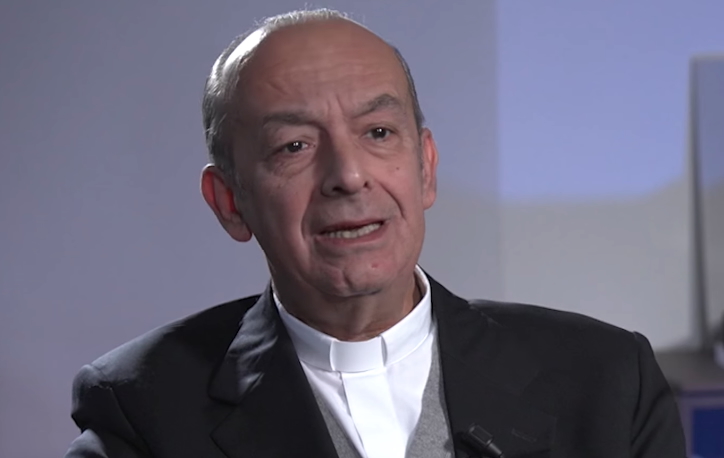 Monsignor Maurizio Gronchi. Credit: EWTN Noticias
Monsignor Maurizio Gronchi. Credit: EWTN Noticias
, Dec 28, 2025 / 08:00 am (CNA).
Vatican expert explains that the titles “Co-Redemptrix” and “Mediatrix” will no longer be used in the liturgy or official documents but can be used in popular piety if properly understood.
Posted on 12/28/2025 11:00 AM (Catholic News Agency)
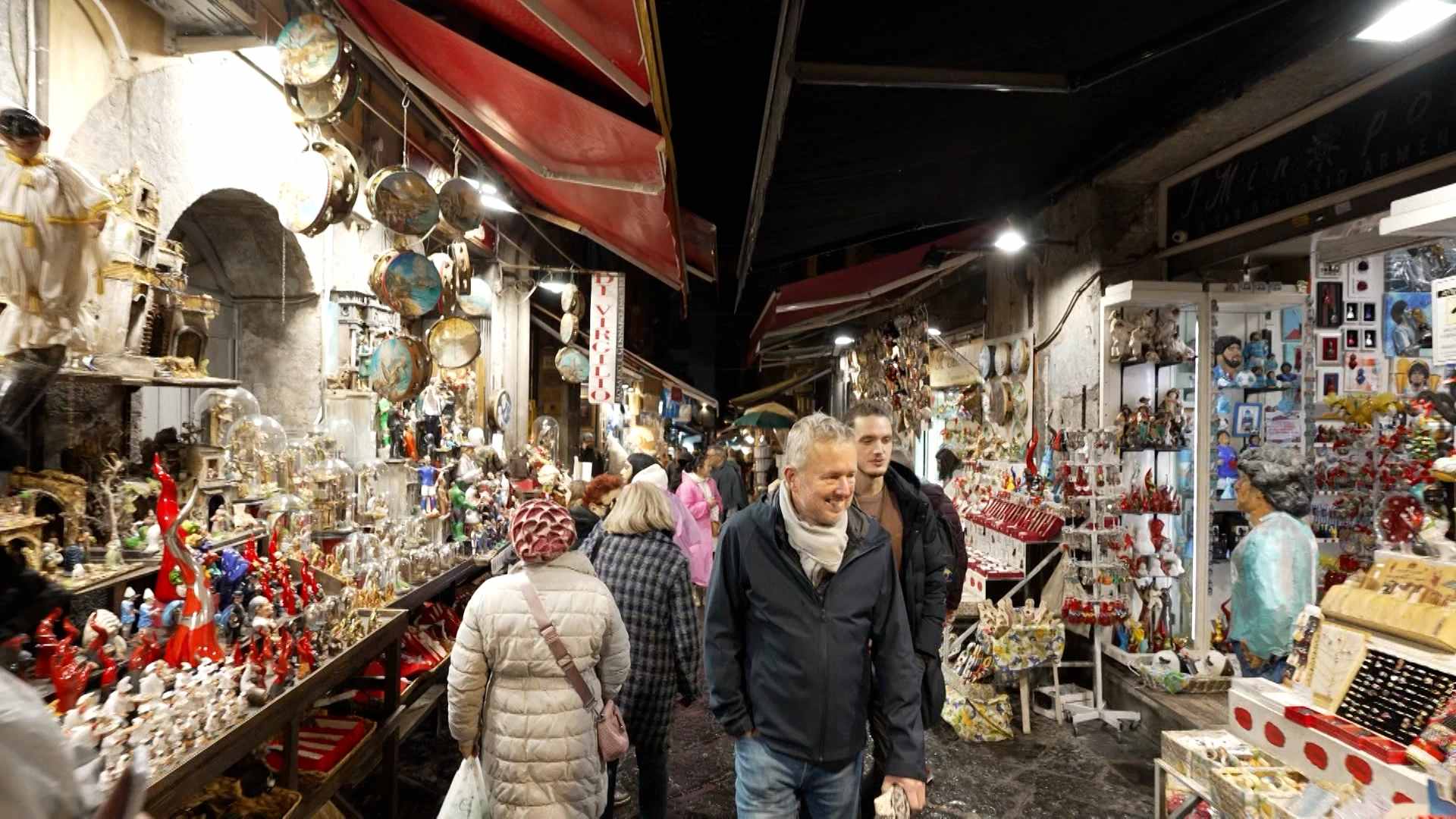 Bottega Ferrigno is located in the iconic “Christmas Alley,” part of the southern Italian city of Naples’ historic San Gregorio Armeno neighborhood. | Credit: Gianpiero Passalia/EWTN News
Bottega Ferrigno is located in the iconic “Christmas Alley,” part of the southern Italian city of Naples’ historic San Gregorio Armeno neighborhood. | Credit: Gianpiero Passalia/EWTN News
Rome Newsroom, Dec 28, 2025 / 06:00 am (CNA).
Neapolitan Nativity scenes reflect the style and dress of the 1700s in Naples, the century in which they became popularized by the nobles of the era.
Posted on 12/27/2025 11:00 AM (Catholic News Agency)
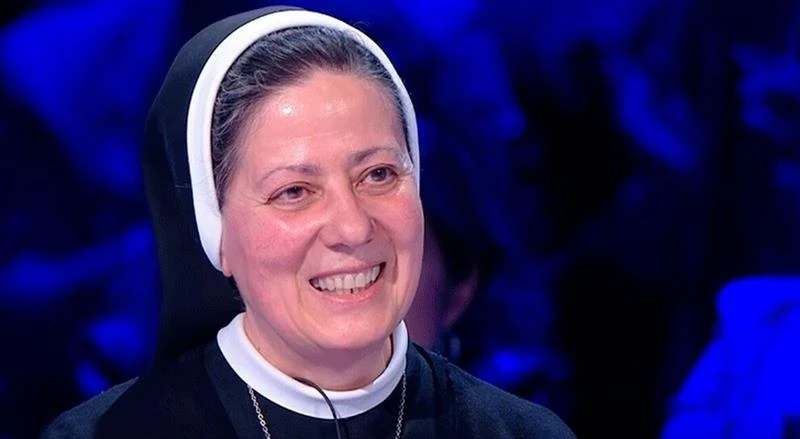 Sister Carla Venditti of the Sacred Heart of Jesus helps women and girls who are victims of human trafficking. | Credit: Photo courtesy of Giulio Gargiullo
Sister Carla Venditti of the Sacred Heart of Jesus helps women and girls who are victims of human trafficking. | Credit: Photo courtesy of Giulio Gargiullo
CNA Staff, Dec 27, 2025 / 06:00 am (CNA).
Sister Carla Venditti of the Apostles of the Sacred Heart of Jesus lives in Avezzano, Italy, and is known as the “anti-trafficking nun.”
Posted on 12/26/2025 21:20 PM (Catholic News Agency)
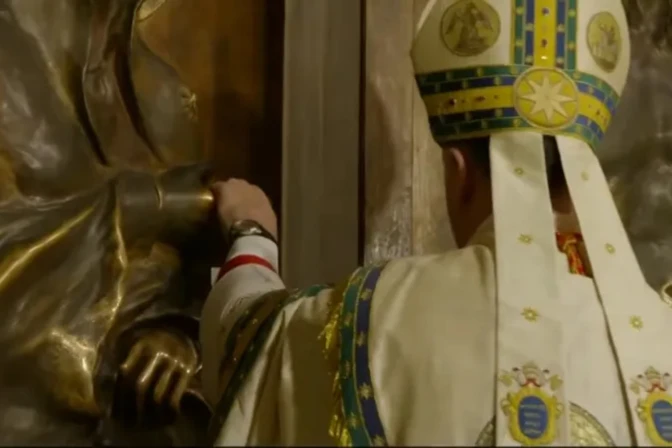 Cardinal Rolandas Makrickas closes the Holy Door at St. Mary Major Basilica in Rome on Dec. 25, 2025. | Credit: Vatican Media
Cardinal Rolandas Makrickas closes the Holy Door at St. Mary Major Basilica in Rome on Dec. 25, 2025. | Credit: Vatican Media
, Dec 26, 2025 / 16:20 pm (CNA).
The Holy Door of St. Mary Major Basilica, one of five in Rome for the 2025 Jubilee Year of Hope, was the first to close.
Posted on 12/26/2025 07:17 AM (CNA Daily News - Vatican)
 Pope Leo XIV addresses pilgrims gathered in St. Peter’s Square at the Vatican for the recitation of the Angelus on Dec. 26, 2025. | Credit: Vatican Media
Pope Leo XIV addresses pilgrims gathered in St. Peter’s Square at the Vatican for the recitation of the Angelus on Dec. 26, 2025. | Credit: Vatican Media
Vatican City, Dec 26, 2025 / 02:17 am (CNA).
Pope Leo XIV on Friday urged Christians to resist the temptation to treat others as enemies, saying the mystery of Christmas calls believers to recognize the God-given dignity of every person, even in their adversaries.
“Christians, however, have no enemies, but brothers and sisters, who remain so even when they do not understand each other,” the pope said Dec. 26 during his Angelus address from the Apostolic Palace on the feast of St. Stephen, the Church’s first martyr.
Leo acknowledged that “those who believe in peace and have chosen the unarmed path of Jesus and the martyrs are often ridiculed, excluded from public discourse,” and sometimes even “accused of favoring adversaries and enemies.” Yet, he said Christian joy is sustained by “the tenacity of those who already live in fraternity.”
Reflecting on St. Stephen’s martyrdom, the pope noted that early Christians spoke of the saint’s “birthday,” convinced “that we are not born just once” and that “martyrdom is a birth into heaven.”
Citing the Acts of the Apostles, Leo recalled that those who witnessed Stephen’s trial and death “saw that his face was like the face of an angel” (Acts 6:15), calling it “the face of one who does not leave history indifferently but responds to it with love.”
The pope linked Stephen’s witness to the meaning of Christmas, saying “the birth of the Son of God among us calls us to live as children of God,” drawing believers through the humility of Mary, Joseph, and the shepherds of Bethlehem.
At the same time, he said, the beauty of Christ and of those who imitate him can be rejected because it exposes injustice and threatens those “who struggle for power.”
“To this day, however, no power can prevail over the work of God,” Leo said, pointing to people around the world who choose justice “even at great cost,” who “put peace before their fears,” and who serve the poor.
“In the current conditions of uncertainty and suffering in the world, joy might seem impossible,” he added, but insisted hope still “sprouts” and “it makes sense to celebrate despite everything.”
The pope said Stephen’s final act of forgiveness mirrors Jesus’ own, flowing from “a force more real than that of weapons,” a “gratuitous force” rekindled when people learn to look at their neighbor with “attention and recognition.”
“Yes, this is what it means to be reborn, to come once more into the light, this is our ‘Christmas!’” he said.
After the Angelus, Leo renewed his Christmas wishes “for peace and serenity,” greeted pilgrims in St. Peter’s Square, and asked St. Stephen’s intercession for persecuted Christians and communities suffering for their faith. He also encouraged those working amid conflict to pursue “dialogue, reconciliation, and peace.”
This story was first published by ACI Prensa, CNA’s Spanish-language news partner. It has been translated and adapted by CNA.
Posted on 12/25/2025 07:00 AM (CNA Daily News - Vatican)
 Pope Leo XIV blesses a baby on All Saints Day’ 2025. | Credit: Vatican Media
Pope Leo XIV blesses a baby on All Saints Day’ 2025. | Credit: Vatican Media
Vatican City, Dec 25, 2025 / 02:00 am (CNA).
Pope Leo XIV has welcomed and greeted a plethora of babies at the Vatican since his election on May 8. As Christians everywhere celebrate the birth of Jesus, who came into this world as a baby, it’s a perfect time to highlight many of these sweet “pontiff meets babies” moments.
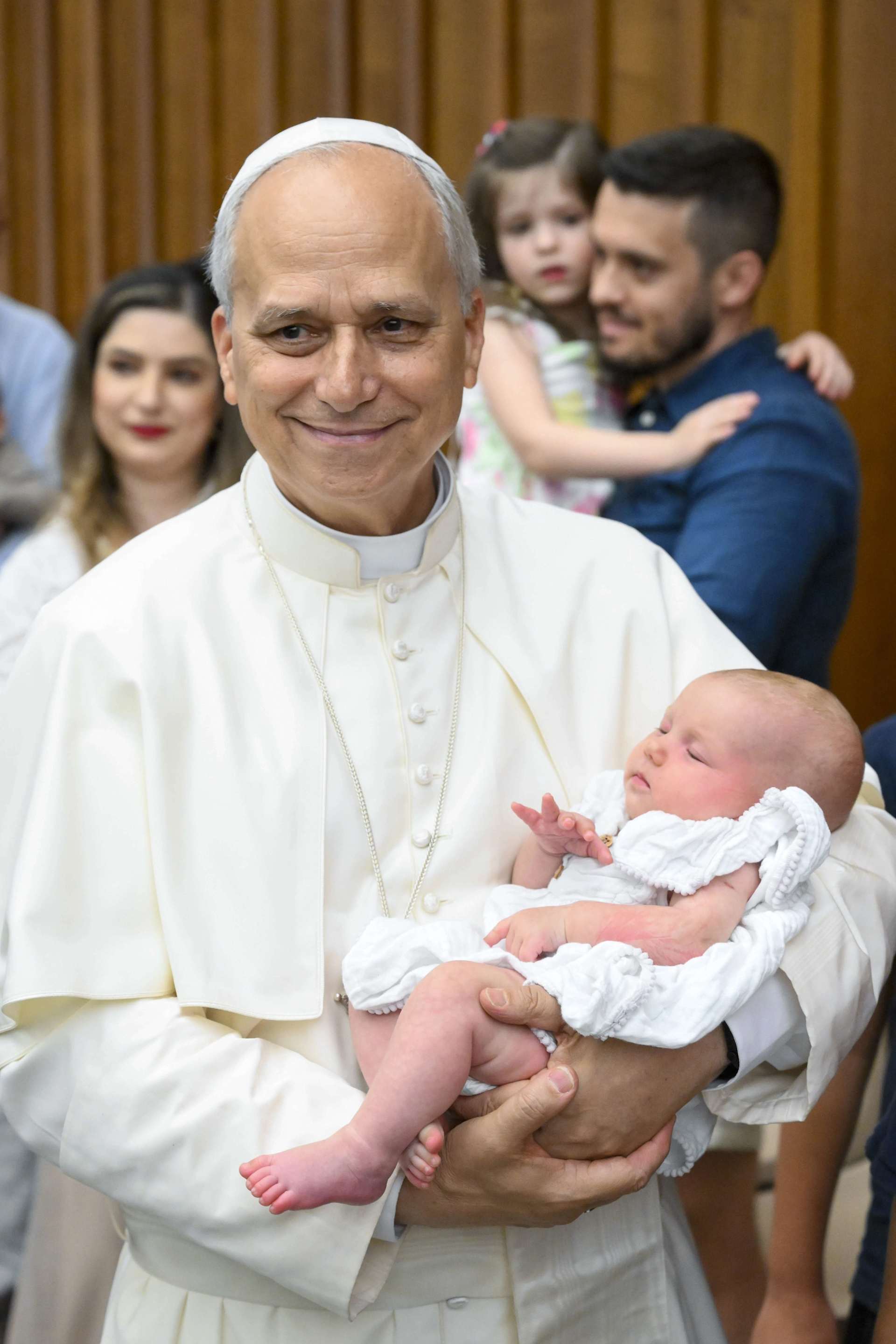
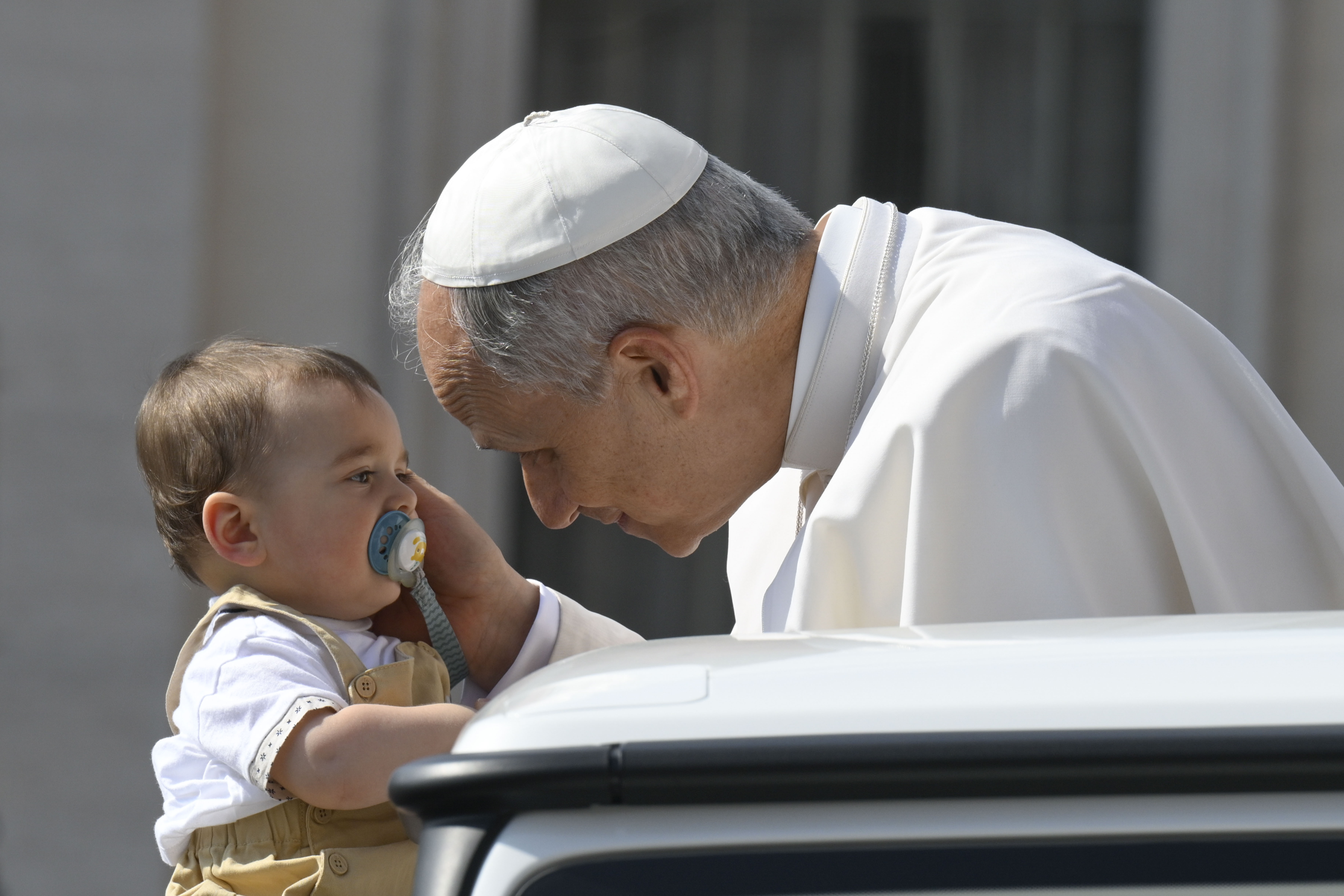
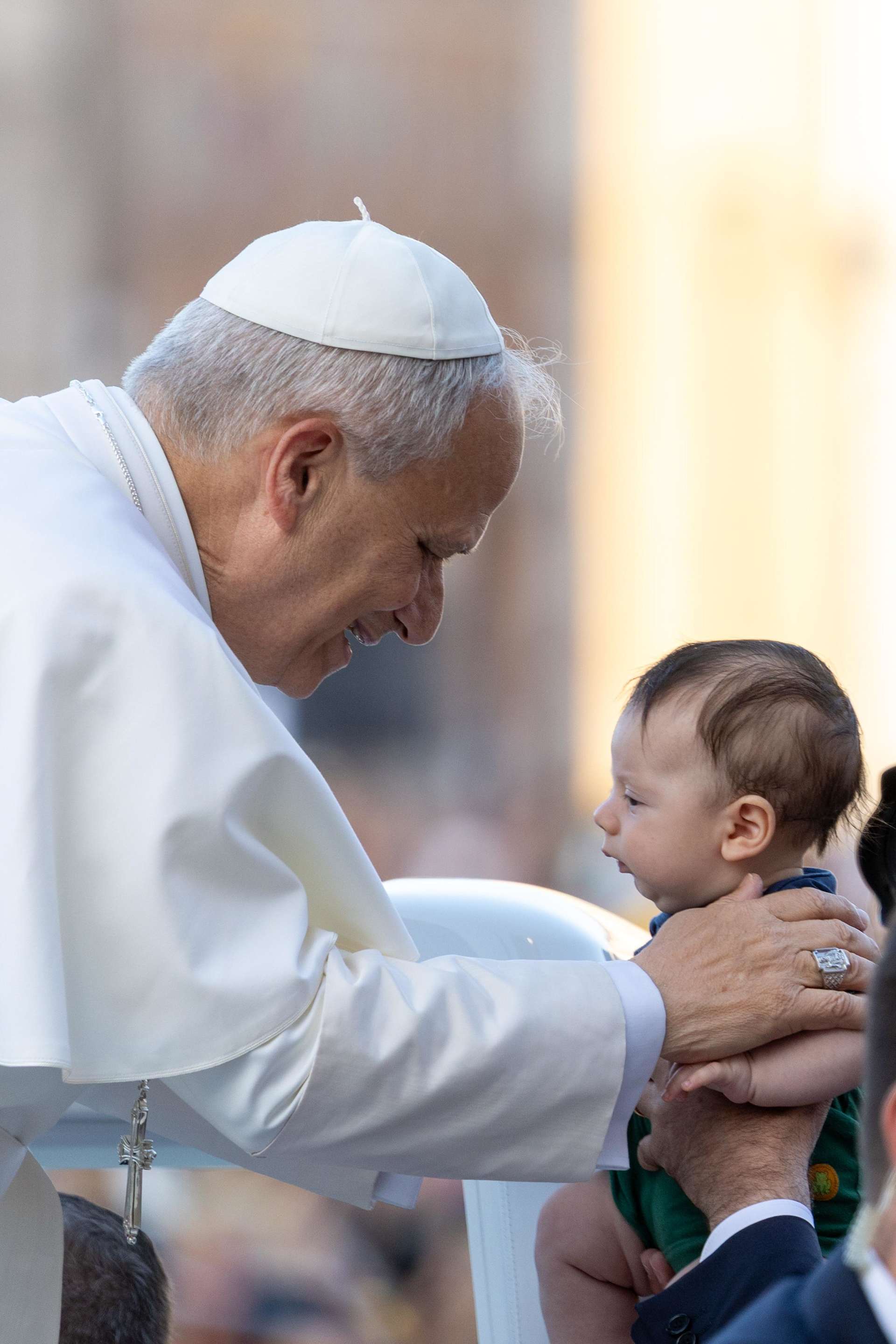
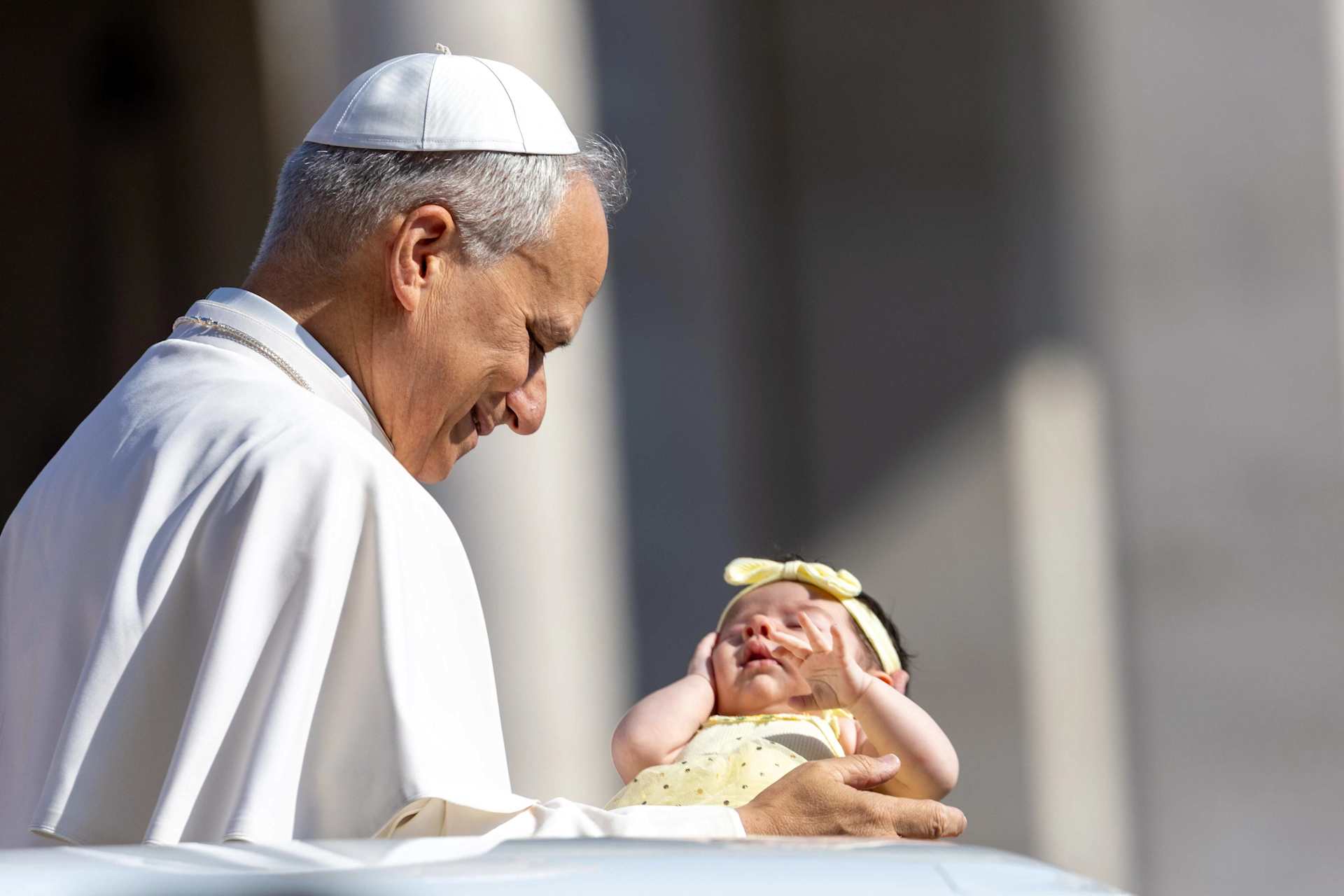
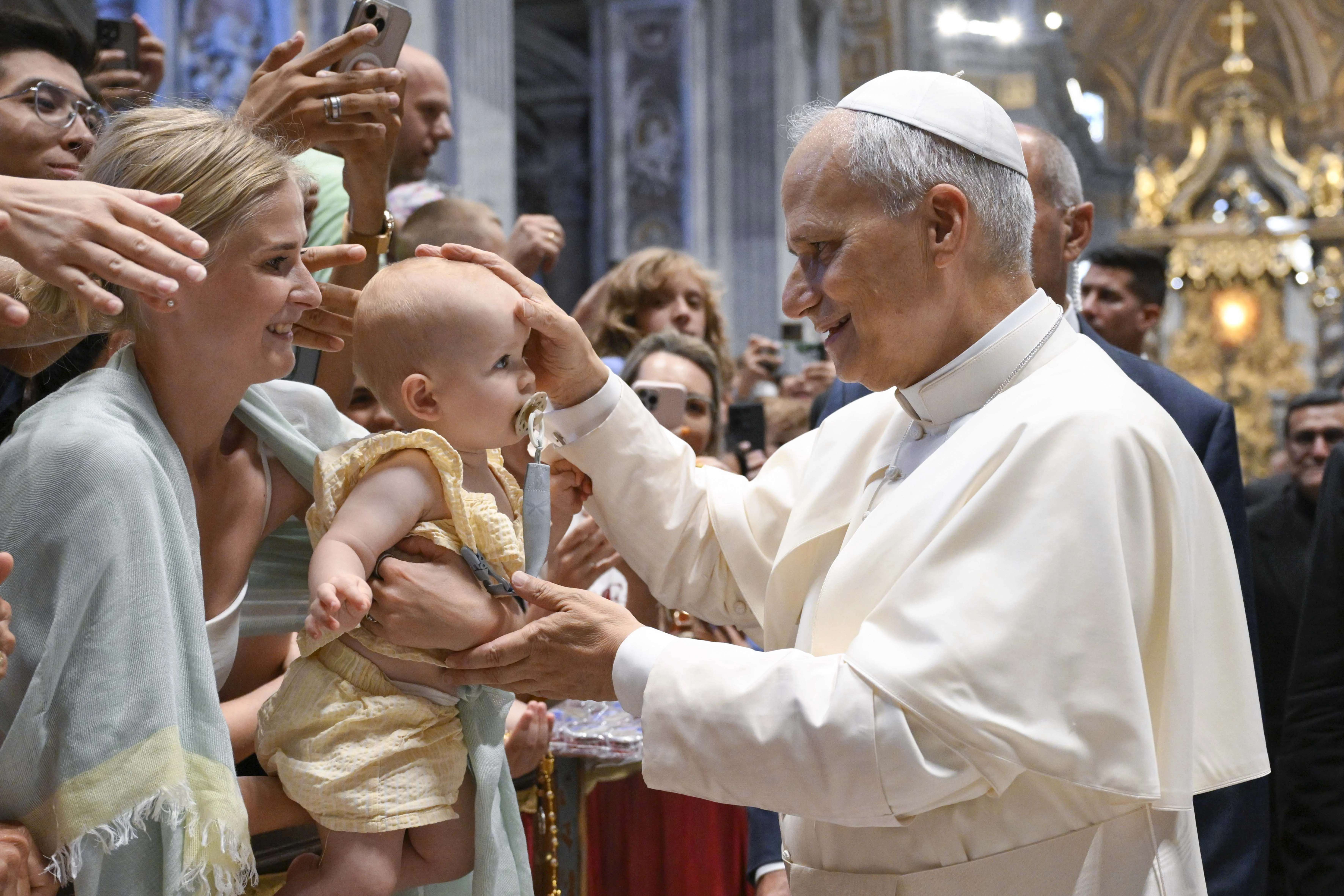
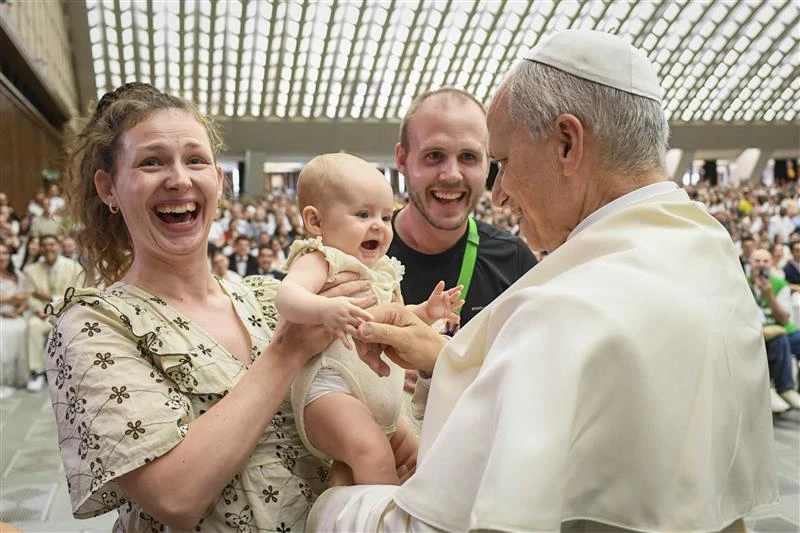
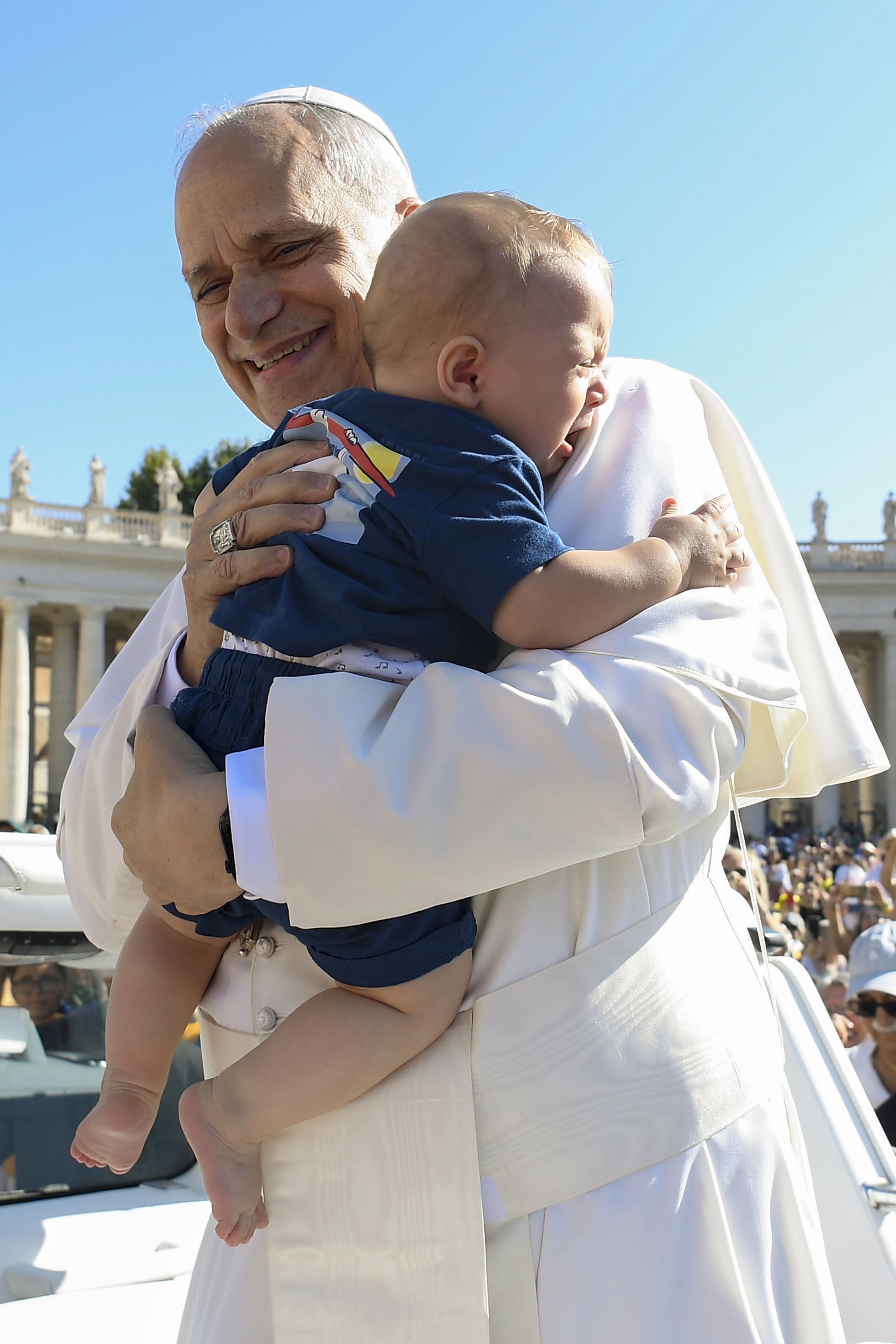
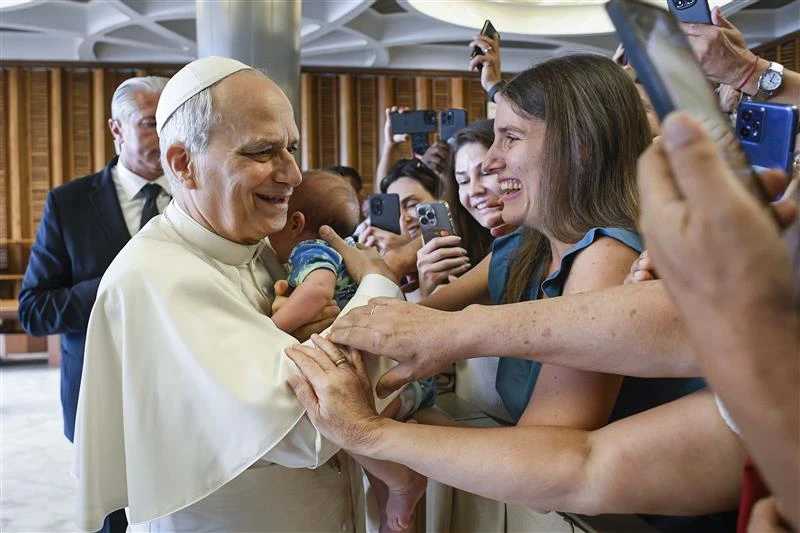
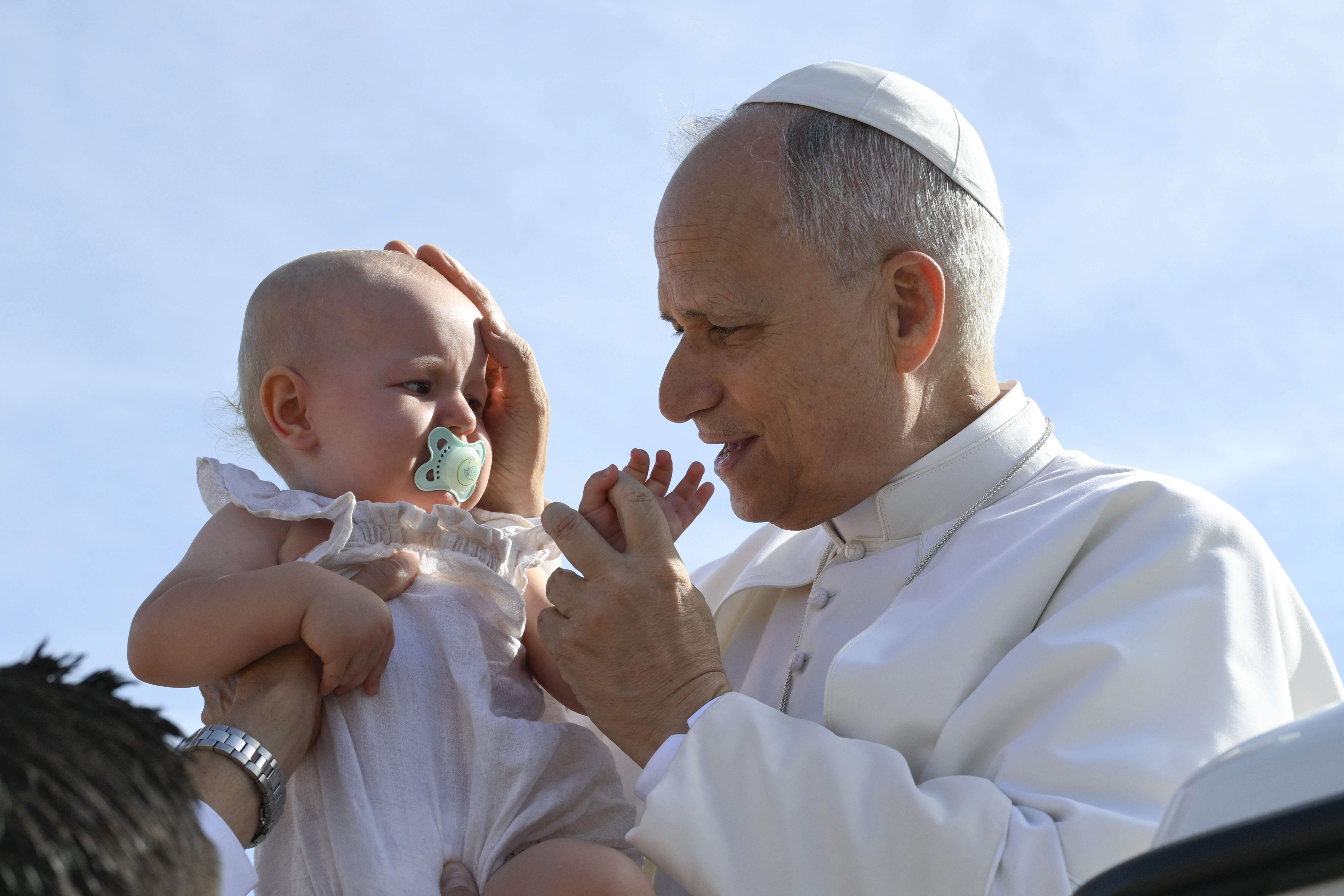
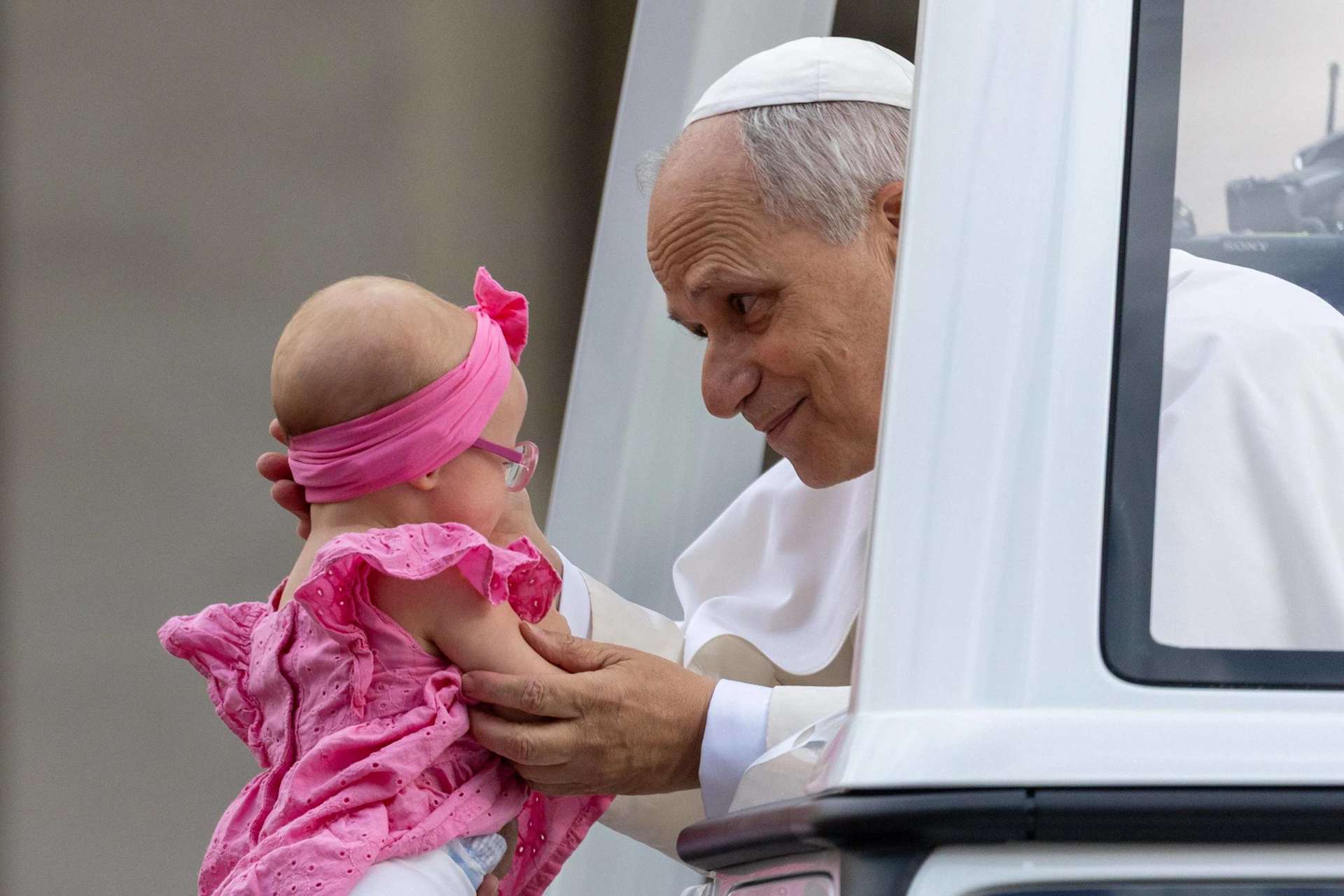
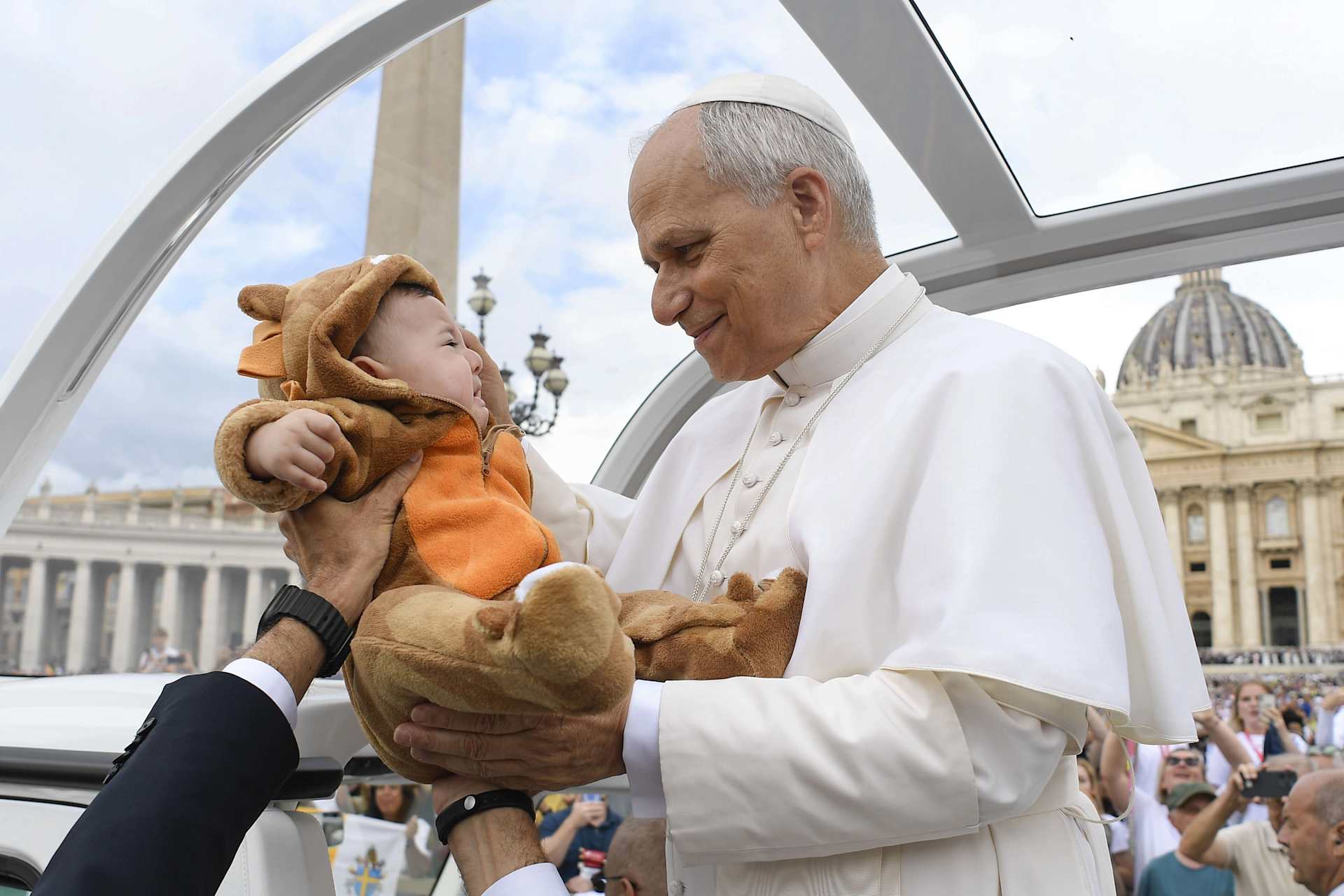
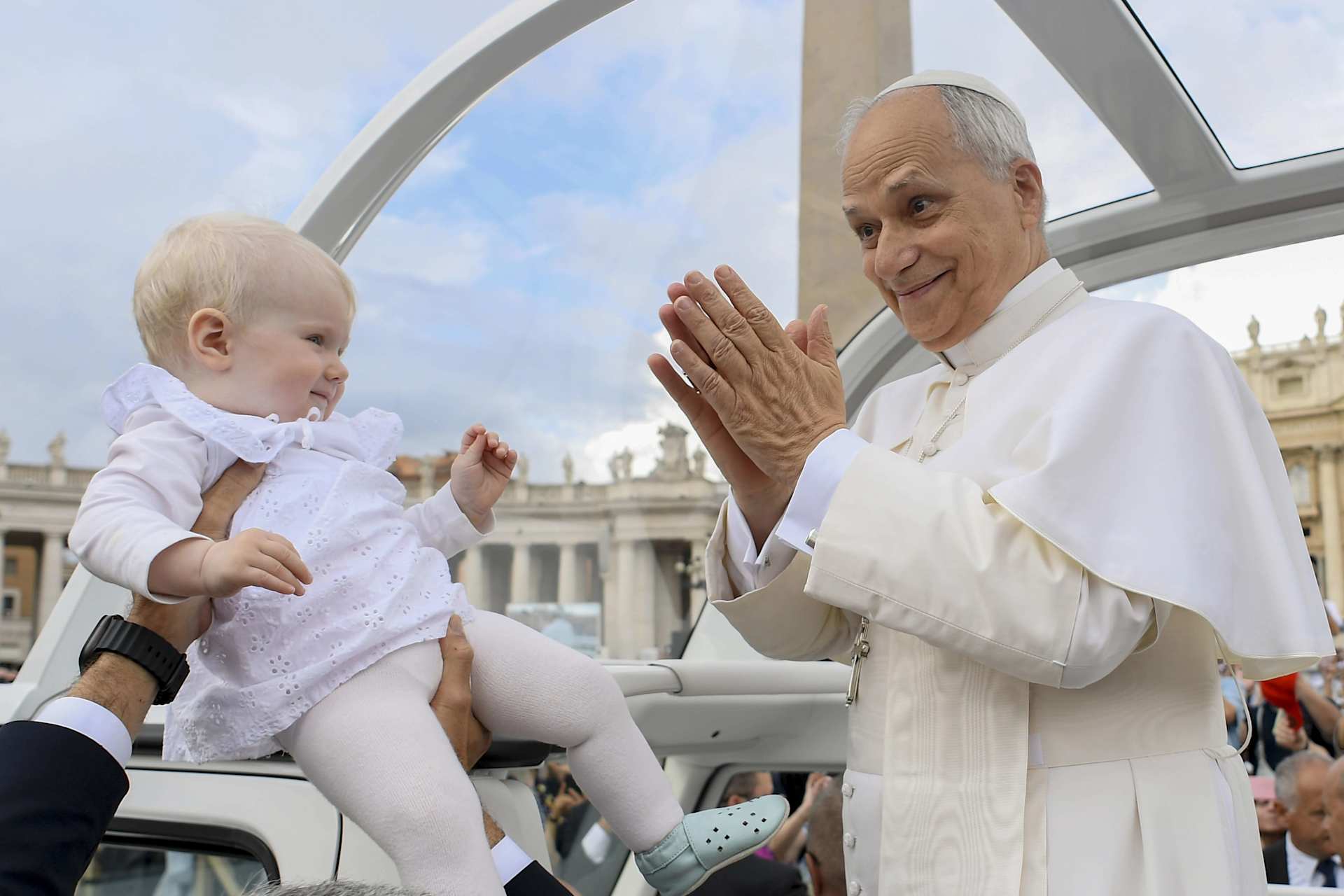
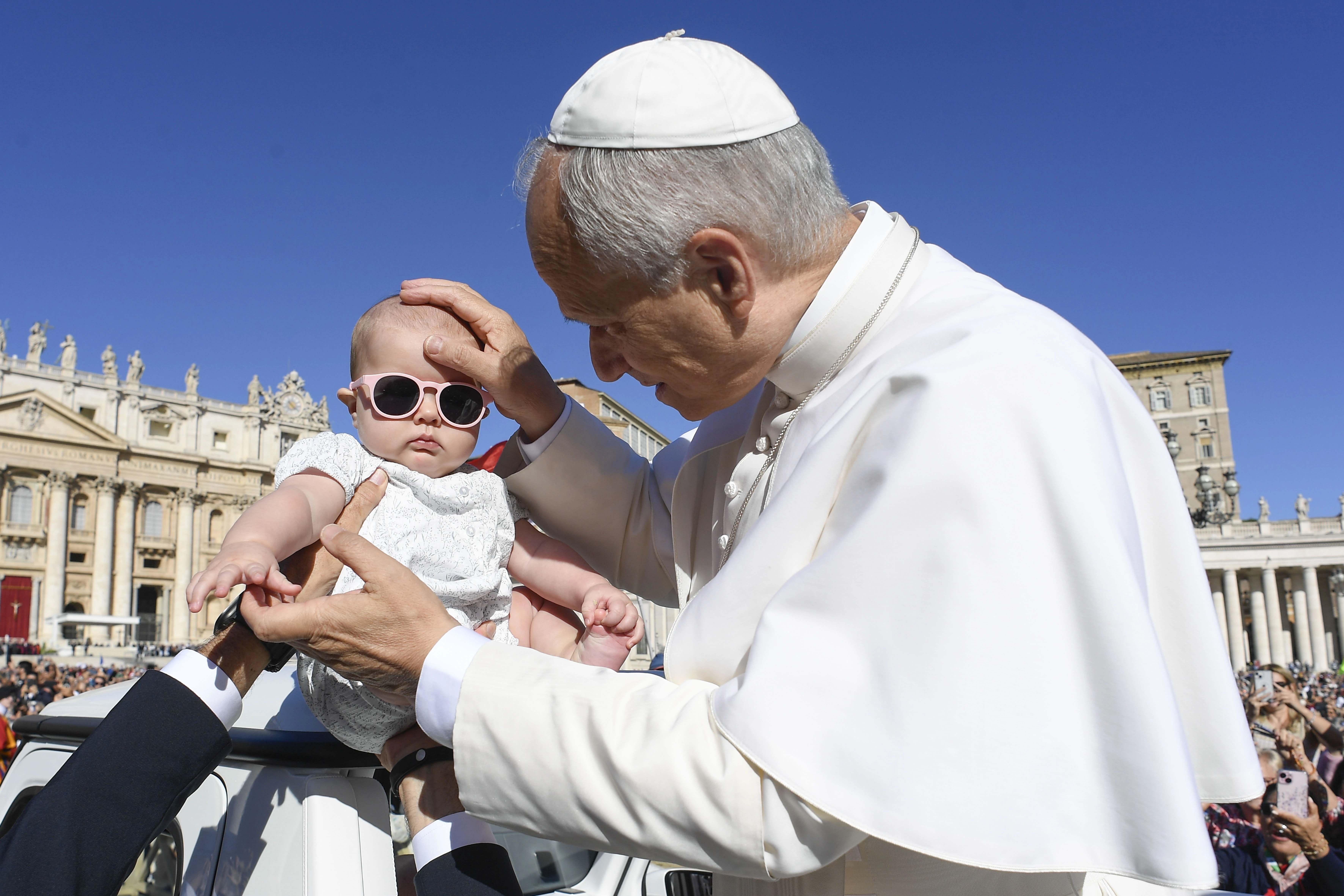
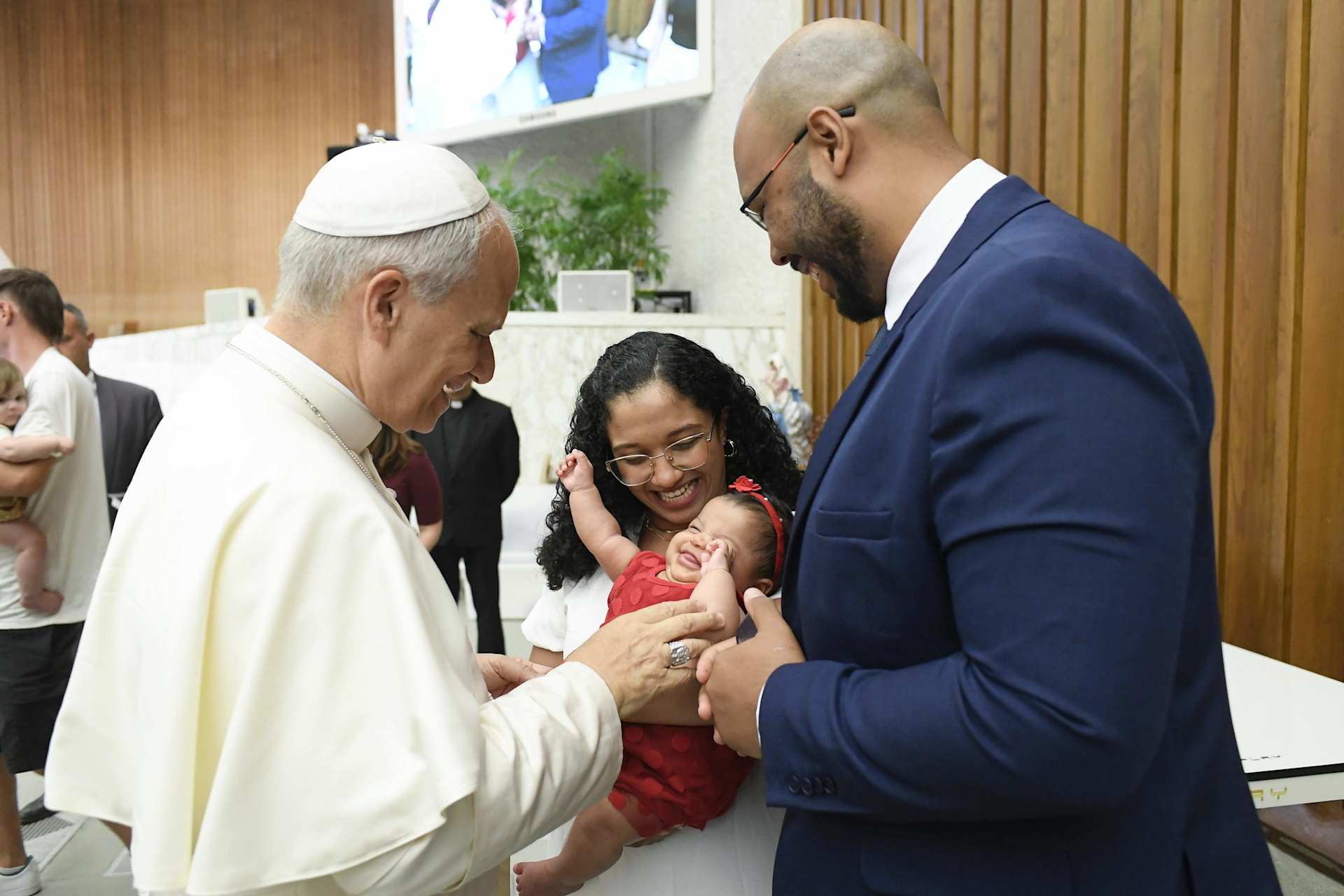
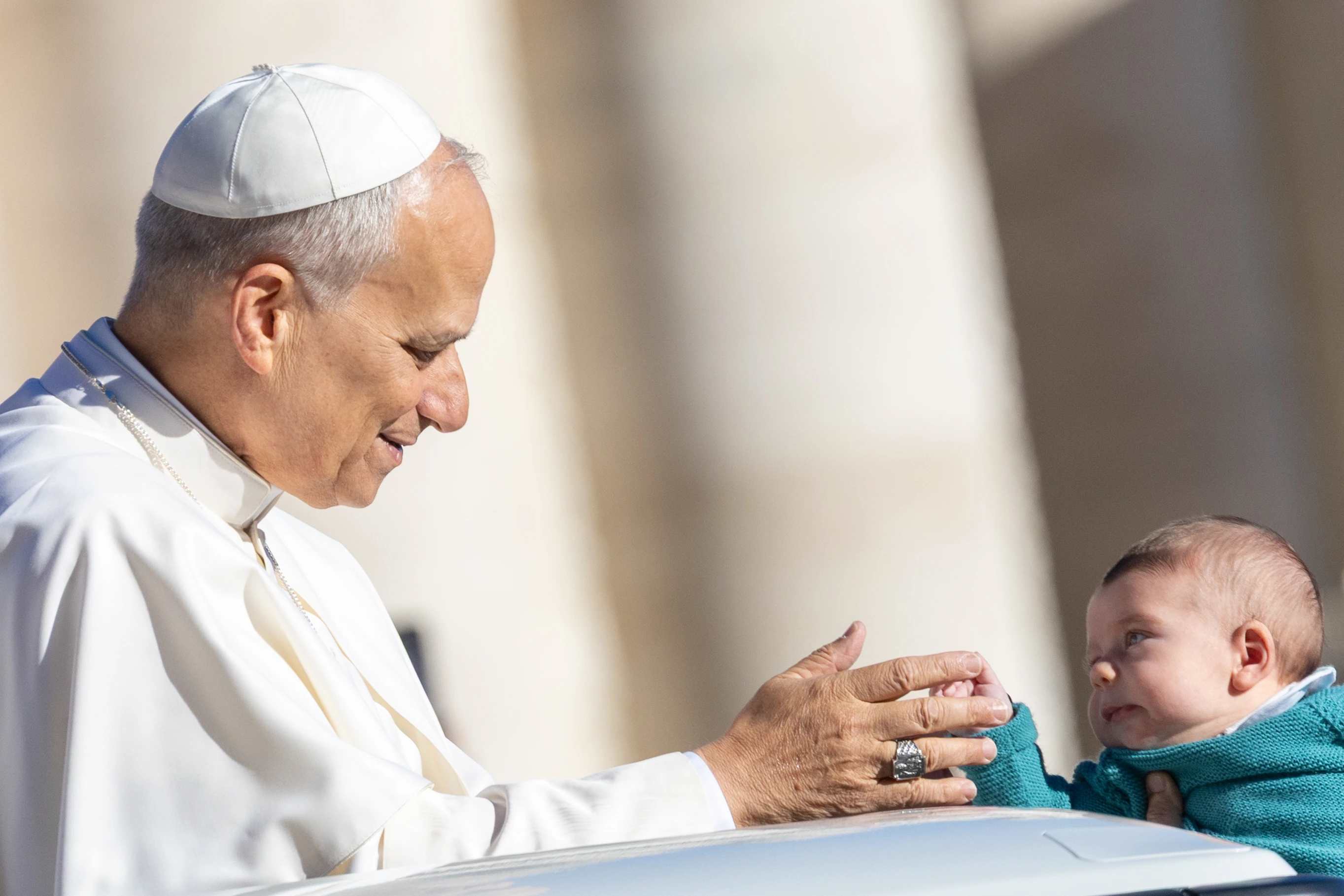
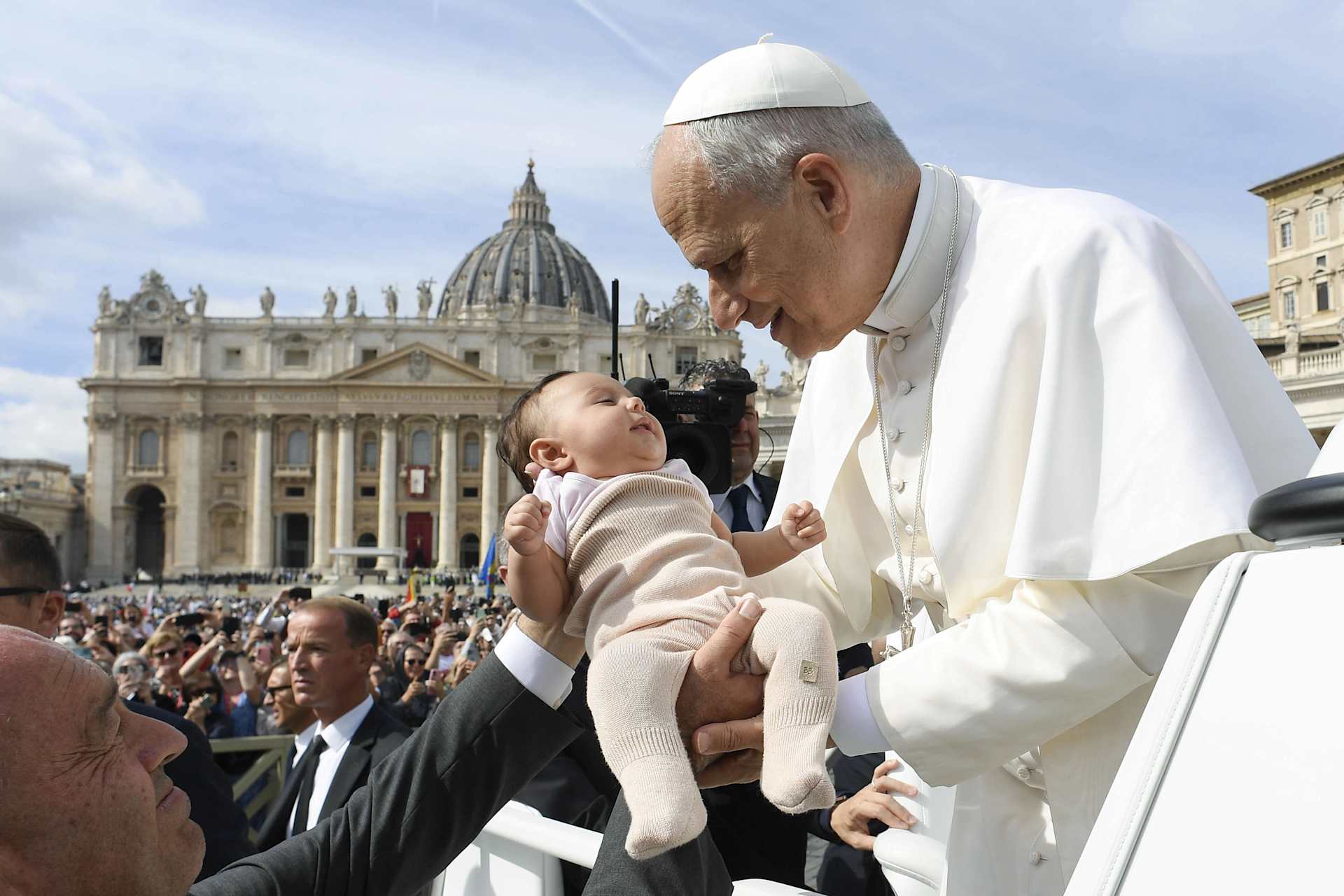
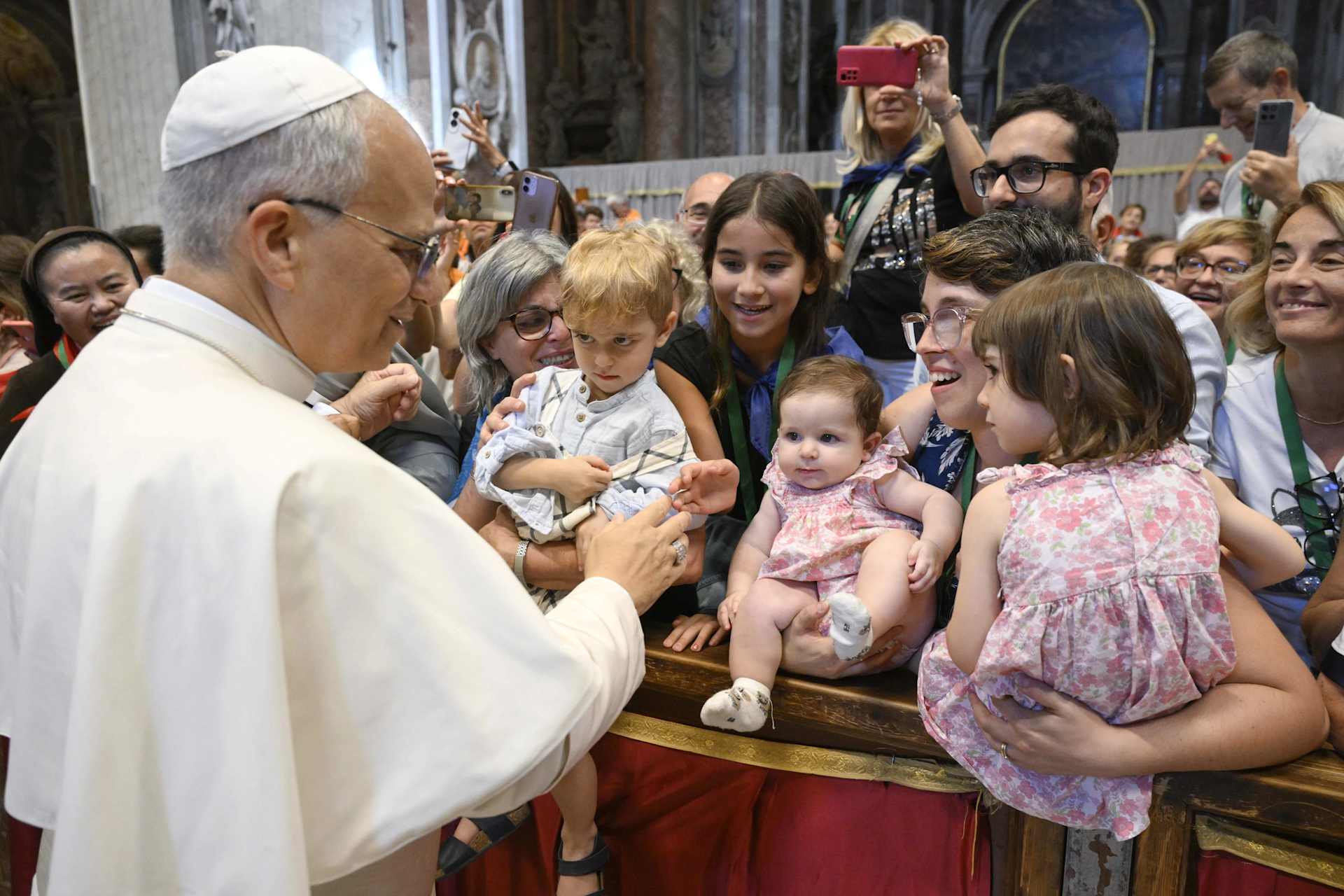
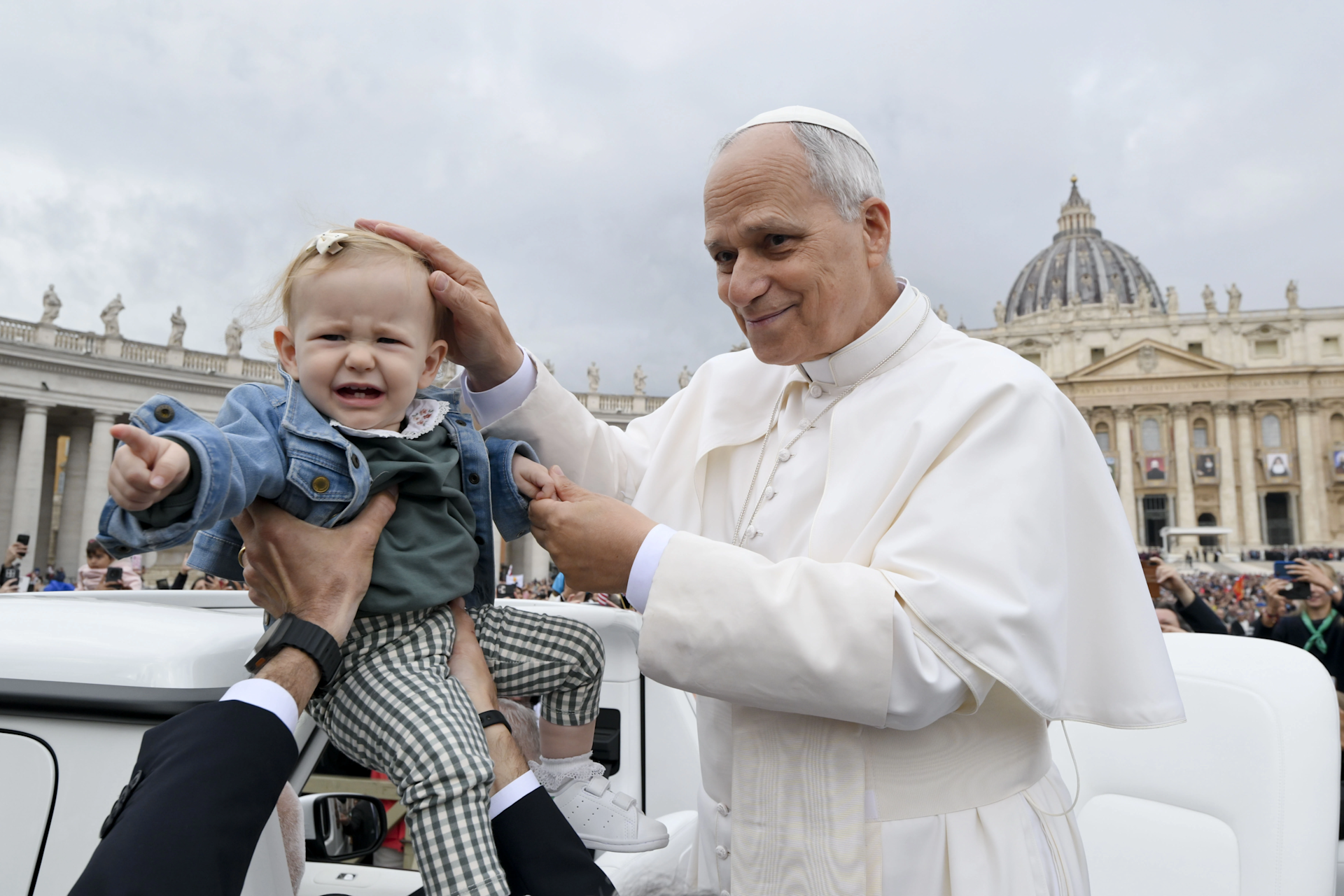
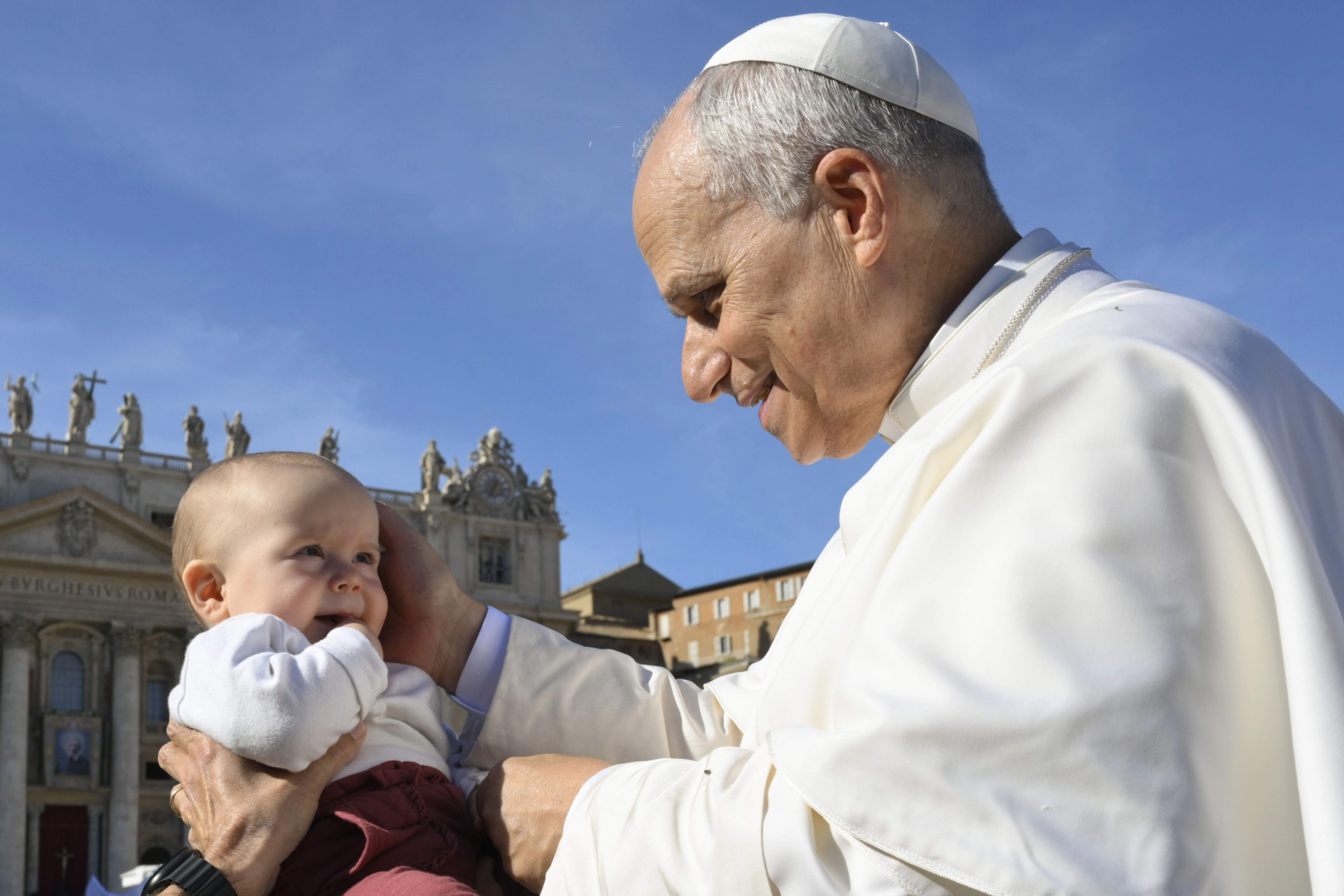
Posted on 12/25/2025 07:00 AM (CNA Daily News - Vatican)
 Pope Leo XIV delivers his Christmas “urbi et orbi” message at the Vatican on Dec. 25, 2025. | Credit: Daniel Ibañez/EWTN News
Pope Leo XIV delivers his Christmas “urbi et orbi” message at the Vatican on Dec. 25, 2025. | Credit: Daniel Ibañez/EWTN News
Vatican City, Dec 25, 2025 / 02:00 am (CNA).
In his first Christmas “urbi et orbi” message as pope, Leo XIV urged the world to embrace “responsibility” as the sure way to peace while pointing in particular to the suffering of people in Gaza, Yemen, and those fleeing war and poverty as refugees and migrants.
Before an estimated 26,000 people gathered in St. Peter’s Square on Dec. 25, the pope appeared at the central balcony of St. Peter’s Basilica to deliver the traditional Christmas blessing “to the city and to the world,” eight months after his May 8 election.
In one of the most evocative passages of the message, the pope cited at length from “Wildpeace,” a poem by Israeli poet Yehuda Amichai, contrasting “the peace of a ceasefire” with a deeper peace that arrives unexpectedly — “like wildflowers” — after exhaustion and conflict.
“Responsibility is the sure way to peace,” Leo said. “If all of us, at every level, would stop accusing others and instead acknowledge our own faults, asking God for forgiveness, and if we would truly enter into the suffering of others and stand in solidarity with the weak and the oppressed, then the world would change.”
The pope framed his appeal around the Christian proclamation that Christ “is our peace,” adding: “Without a heart freed from sin, a heart that has been forgiven, we cannot be men and women of peace or builders of peace.”
Turning to concrete “faces” of contemporary pain, Leo said that in becoming man, Jesus “took upon himself our fragility, identifying with each one of us: with those who have nothing left and have lost everything, like the inhabitants of Gaza; with those who are prey to hunger and poverty, like the Yemeni people; with those who are fleeing their homeland to seek a future elsewhere, like the many refugees and migrants who cross the Mediterranean or traverse the American continent.”
He also named those who have lost jobs, underpaid workers who are exploited, and prisoners “who often live in inhumane conditions.”
Leo offered “a warm and fatherly greeting” to Christians, “especially those living in the Middle East,” recalling his recent trip to Turkey and Lebanon. “I listened to them as they expressed their fears and know well their sense of powerlessness before the power dynamics that overwhelm them,” he said.
“From God let us ask for justice, peace, and stability for Lebanon, Palestine, Israel, and Syria,” the pope continued as he invoked Scripture on righteousness and peace.
He also prayed “in a particular way for the tormented people of Ukraine,” asking that “the clamor of weapons cease” and that the parties involved — “with the support and commitment of the international community” — find “the courage to engage in sincere, direct, and respectful dialogue.”
In a wider survey of global crises, the pope said: “From the Child of Bethlehem, we implore peace and consolation for the victims of all current wars in the world, especially those that are forgotten, and for those who suffer due to injustice, political instability, religious persecution, and terrorism,” naming Sudan, South Sudan, Mali, Burkina Faso, and the Democratic Republic of Congo. He prayed as well for Haiti, asking that “all forms of violence in the country will cease,” and called for a future of reconciliation for Myanmar.
Leo also included a specific appeal for Latin America, asking that “the child Jesus inspire those in Latin America who hold political responsibilities” so that amid the region’s challenges, “space may be given to dialogue for the common good rather than to ideological and partisan prejudices.”
He concluded by urging the faithful to open their hearts to those in need: “On this holy day, let us open our hearts to our brothers and sisters who are in need or in pain,” before offering “heartfelt good wishes for a peaceful and holy Christmas!”
This story was first published by ACI Prensa, CNA’s Spanish-language news partner. It has been translated and adapted by CNA.
Posted on 12/25/2025 06:35 AM (CNA Daily News - Vatican)
 Pope Leo XIV celebrates Mass in St. Peter’s Basilica at the Vatican on Dec. 25, 2025. | Credit: Daniel Ibañez/EWTN News
Pope Leo XIV celebrates Mass in St. Peter’s Basilica at the Vatican on Dec. 25, 2025. | Credit: Daniel Ibañez/EWTN News
Vatican City, Dec 25, 2025 / 01:35 am (CNA).
Pope Leo XIV on Christmas Day deplored the “falsehoods” used to justify wars that leave young people “forced to take up arms” and “sent to their deaths,” while also drawing attention to the humanitarian suffering of displaced people, including families living in tents in Gaza.
In his first Christmas as pope, Leo celebrated Christmas Day Mass in St. Peter’s Basilica, reviving a practice not seen since 1994 during the pontificate of St. John Paul II. Reflecting on the prologue of St. John’s Gospel, the pope said in his homily that the Christmas liturgy highlights a striking contrast: God’s Word, which acts with power, comes into the world in utter weakness.
“The ‘Word’ is a word that acts,” Leo said. Yet, he added, “the Word of God appears but cannot speak. He comes to us as a newborn baby who can only cry and babble.”
Leo said the mystery Christians celebrate at Christmas cannot be separated from the vulnerability of those whose dignity is assaulted by war, displacement, and poverty. He urged Catholics to let Christ’s birth pierce complacency and move them toward tenderness and solidarity.
“‘Flesh’ is the radical nakedness that, in Bethlehem as on Calvary, remains even without words — just as so many brothers and sisters, stripped of their dignity and reduced to silence, have no words today,” he said.
In one of the homily’s most striking passages, Leo connected the Gospel image of the Word “pitching” his tent among humanity with the reality faced by families living in makeshift shelters amid conflict.
“Dear brothers and sisters, since the Word was made flesh, humanity now speaks, crying out with God’s own desire to encounter us. The Word has pitched his fragile tent among us,” he said, before asking: “How, then, can we not think of the tents in Gaza, exposed for weeks to rain, wind, and cold; and of those of so many other refugees and displaced persons on every continent; or of the makeshift shelters of thousands of homeless people in our own cities?”
The pope also described the toll of war in terms of both shattered communities and wounded consciences.
“Fragile is the flesh of defenseless populations, tried by so many wars, ongoing or concluded, leaving behind rubble and open wounds,” he said. “Fragile are the minds and lives of young people forced to take up arms, who on the front lines feel the senselessness of what is asked of them and the falsehoods that fill the pompous speeches of those who send them to their deaths.”
Leo framed Christmas as a proclamation that peace is not merely a hope for the future but a gift already present in Christ, even when few recognize it. Quoting Jesus’ words to the disciples, he said: “‘Peace I leave with you; my peace I give to you; not as the world gives do I give to you’ (Jn 14:27).”
That peace, he said, begins not in rhetoric but in concrete compassion that listens, stays close, and responds to suffering.
“When the fragility of others penetrates our hearts, when their pain shatters our rigid certainties, then peace has already begun,” he said. “The peace of God is born from a newborn’s cry that is welcomed, from weeping that is heard. It is born amidst ruins that call out for new forms of solidarity.”
The pope warned that believers can bury what the Gospel calls “the power to become children of God” by keeping their distance from the vulnerable.
“Becoming children of God is a true power — one that remains buried so long as we keep our distance from the cry of children and the frailty of the elderly, from the helpless silence of victims and the resigned melancholy of those who do the evil they do not want,” he said.
This story was first published by ACI Prensa, CNA’s Spanish-language news partner. It has been translated and adapted by CNA.